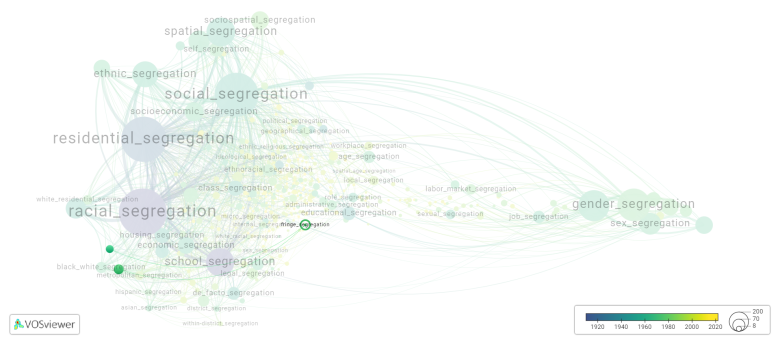Fringe segregation: Difference between revisions
(Creating page) |
(Creating page) |
||
| Line 10: | Line 10: | ||
Efforts to combat fringe segregation typically involve promoting acceptance, inclusion, and diversity, challenging stereotypes and stigmas, and advocating for equal rights and opportunities for all individuals, regardless of their differences. | Efforts to combat fringe segregation typically involve promoting acceptance, inclusion, and diversity, challenging stereotypes and stigmas, and advocating for equal rights and opportunities for all individuals, regardless of their differences. | ||
==See also== | ==See also== | ||
==Related segregation forms== | |||
Fringe segregation is frequently discussed in the literature with the following segregation forms: | |||
[[black residential segregation]], [[black segregation]], [[job segregation]] | |||
[[File:fringe_segregation.png|780x780px]] | |||
For the complete network of associated segregation forms, see: | |||
year of publication https://tinyurl.com/2235lkhw | |||
Louvain clusters https://tinyurl.com/2d8wg5n3 | |||
betweenness centrality https://tinyurl.com/223udk5r | |||
disciplines where segregation forms first appeared https://tinyurl.com/244d8unz | |||
==References== | ==References== | ||
==Notes== | ==Notes== | ||
Revision as of 14:35, 27 September 2024
Date and country of first publication[1]
1983
United States
Definition
Fringe segregation refers to the practice of excluding or separating individuals or groups based on characteristics that are considered unconventional, non-mainstream, or outside the norm. This can include discrimination based on factors such as beliefs, appearance, lifestyle choices, or social status.
Fringe segregation can manifest in various forms, including social exclusion, discrimination in employment or housing, hate crimes, and unequal access to resources and opportunities. This type of segregation often perpetuates stereotypes, reinforces social inequality, and hinders the integration and acceptance of diverse individuals and communities.
Efforts to combat fringe segregation typically involve promoting acceptance, inclusion, and diversity, challenging stereotypes and stigmas, and advocating for equal rights and opportunities for all individuals, regardless of their differences.
See also
Related segregation forms
Fringe segregation is frequently discussed in the literature with the following segregation forms:
black residential segregation, black segregation, job segregation

For the complete network of associated segregation forms, see:
year of publication https://tinyurl.com/2235lkhw
Louvain clusters https://tinyurl.com/2d8wg5n3
betweenness centrality https://tinyurl.com/223udk5r
disciplines where segregation forms first appeared https://tinyurl.com/244d8unz
References
Notes
- ↑ Date and country of first publication as informed by the Scopus database (December 2023).
At its current state, this definition has been generated by a Large Language Model (LLM) so far without review by an independent researcher or a member of the curating team of segregation experts that keep the Segregation Wiki online. While we strive for accuracy, we cannot guarantee its reliability, completeness and timeliness. Please use this content with caution and verify information as needed. Also, feel free to improve on the definition as you see fit, including the use of references and other informational resources. We value your input in enhancing the quality and accuracy of the definitions of segregation forms collectively offered in the Segregation Wiki ©.
Fringe segregation appears in the following literature
Stahura J.M. (1983). Determinants of Change in the Distribution of Blacks across Suburbs. Sociological Quarterly, 24(3), 421-433. https://doi.org/10.1111/j.1533-8525.1983.tb00711.x
Shanske D., Niemeier D. (2021). Subsidizing sprawl, segregation, and regressivity: A deep dive into sublocal tax districts. Iowa Law Review, 106(5), 2427-2450. University of Iowa.https://doi.org/
